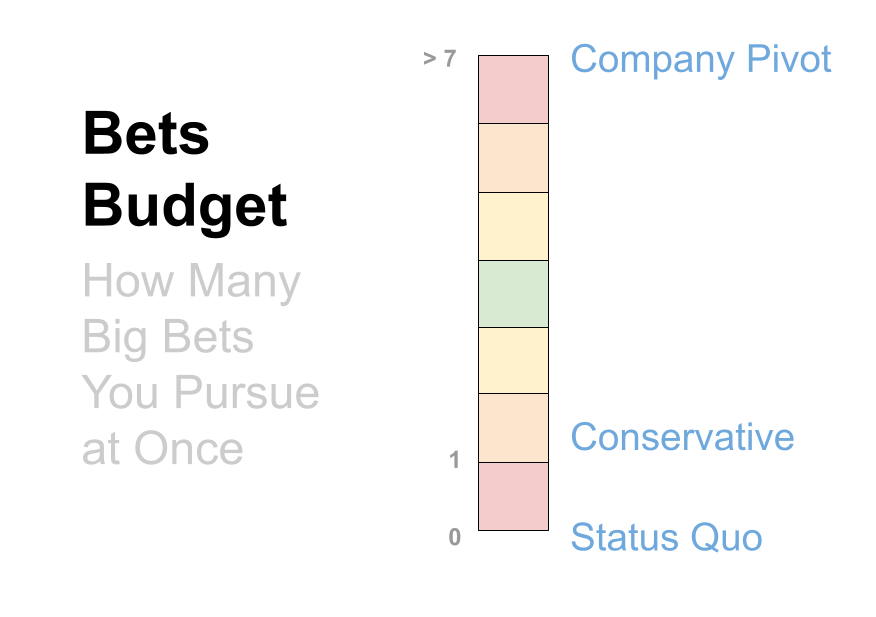Making Big Bets
You only have a few big bets to make, so choose the right ones.
If you liked reading this, please click the ❤️ button on this post so more people can discover it on Substack. Thanks!
One of my favorite quotes about business is from the movie Ocean’s Eleven:
“Play long enough, you never change the stakes, the house takes you. Unless, when that perfect hand comes along, you bet big, and then you take the house.”
Danny Ocean, Ocean’s Eleven
In business, the odds of success are remarkably low. There are so many things aligned against you, including the market, competition, capital limitations. In fact, if you think about it too long you start to wonder how any business manages to succeed at all.
If you play a game with the odds stacked against you, you do not win by playing it safe. If you constantly make the safe bets, you are slowly losing the game. It might not look that way, especially if you start with a lot of money, but it’s happening and eventually it will become obvious. If you want evidence, look no farther than the relatively short life spans of the leading companies of any era. Companies do not live forever, because they eventually find enough success that they start playing it safe and once that happens the end has begun.
As leaders, our jobs are not just to stay the course. Our jobs are to ensure the business succeeds and that means taking risks. At the same time, you cannot risk everything all the time or else you’ll recklessly fail. There needs to be a balance between being safe and being risky, and finding it is our job as leaders.
I think about this balance as a series of bets. Every year you have a budget of big bets you can make. Not all of your bets will pay off, but if even a few of them do you will have made significant steps forward as a business. You can adjust where you are on the safe vs risk scale by how big you make that budget of bets.
Each bet needs to be ambitious and company-changing in scope. They aren’t worth making if they are not! Examples of common bets are:
Expanding your product portfolio
Changing your pricing model
Expanding to new geographies
Acquiring other companies
Rolling out a new feature is not a bet, that’s part of the normal course of business. Likewise, hiring a new employee is not a bet. Bets should have the potential to change how fast the company grows. Bets don’t help you grow by 2%, they help you grow by 20%.
For example, let’s say we have an enterprise software company that makes $50M in ARR growing 20% year over year. That’s pretty good! If we keep doing what we’re doing, we’ll end the year around $60M in ARR and maybe that is all we need.
However, that assumes nothing goes wrong. Maybe a new competitor launches, or another competitor lowers their price. Maybe there is a macroeconomic event that jeopardizes our buyers. Or maybe we hurt ourselves through major outages or buggy releases. Any single event could mean the status quo is disrupted and our business suffers.
As a result, we might choose to have a budget of 3 bets for the year. Those 3 bets might be:
Expand internationally into Japan.
Experiment with a new pricing scheme that includes a free tier.
Acquire a smaller product and roll it into our solution offering.
Any one of those bets is likely to fail on their own, but as a portfolio of bets it’s likely at least one of them succeeds. If it does, it will have meaningfully changed our trajectory as a company and positioned us to withstand risks to our status quo. They will also have helped us grow faster than we would have otherwise.
If we wanted to take more risks, we would just increase our budget of bets. If we are concerned about the distraction to our core business, we would reduce the budget of bets.
One of the most common failures of leadership is to make many smaller, less important bets instead of fewer bets. It seems less risky to just make your bets smaller, but it’s just a mirage. Your bets need to be big, company-changing in scope and ambition. Anything less is just theater designed to make you feel comfortable as you take the safe route.
Sometimes the safe route is the right one! If you’re a small company, you likely can’t afford to do more than one thing at a time so any bets would prevent you from operating your business. In these cases you set your budget of bets to zero.
For most companies, the right budget of bets is greater than 1 but less than 7 with a sweet spot around 3-4. It depends on the size of your company, the specific bets you might make and how stable your core business is over time. It’s also easy to adjust your budget at any time by making new bets or cutting bets you’ve already made. As a leader you should be constantly asking: are we making the right number of bets?
So, are you?
For more on company strategy, see:
You Need a Strategy and here is how to build it
When Competition Matters you need to focus on it!
No matter what, you need to avoid The Plateau of Death.
Do you have a question you’d like me to answer? How about a topic you’d like me to cover? Let me know by filling out this 30 second form and I’ll do my best to cover it in an upcoming issue.




Compelling post…if you have read the Innovators Dilemma, you know how widespread the problem is, especially among successful companies … Sean makes a compelling case for solving the “dilemma”